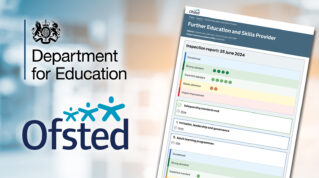Prison leaders have been accused of not taking reading education seriously in a damning joint report by education and prison inspectors.
Reading education in prisons is still hampered by “weak curriculum design” and a lack of specialist staff, Ofsted’s chief inspector has warned – in a new report warning reading is “still not given sufficient priority”.
Despite warnings last year of “serious systemic challenges, as well as plenty of poor practice”, HMI Prisons chief inspector, Charlie Taylor said in this year’s follow-up report that “things have not improved at anything like the rate that Ofsted and HMIP would have expected”.
Inspectors found that staff shortages are still a major problem, that the curriculum had not been improved enough and that the prisoners in most need of reading support were least supported to develop good skills.
While she was “pleased” to see nearly all prisons had “acknowledged the importance of reading”, Ofsted chief inspector Amanda Spielman said “there is more work to do to meet the recommendations we made last year” around teacher provision, staff training and assessment.
In total, HMIP and Ofsted assessed 24 prisons for their progress.
‘Not given sufficient priority’
Last year the report warned many staff did not know how to teach reading, and that a lot of the work was left to voluntary organisations or enthusiastic staff members.
In this year’s follow-up report, Spielman warned staff shortages “still limit the quality of reading education in most prisons”.
At 15 of the prisons visited by Ofsted and HMIP, a shortage of qualified English teachers made it more difficult to teach reading.
“Poor teaching” and a lack of access to education means that prisoners often did not practice their reading skills. Very few of the teachers in prisons were trained to teach using systematic synthetic phonics, the report added.
The lack of training meant that some of the teachers assumed if a prisoner could answer a question on a text correctly, that they could read and understand the whole text.
“Because of continuing weaknesses in curriculum design and teaching, there has not yet been a significant improvement in prisoners’ reading skills,” the report said.
Reading, the report found, is “still not given sufficient priority”.
Difficult to navigate ‘basic aspects of life’
Inspectors found that the prisoners in most need of support were the least well supported to develop good reading skills.
Once in reading education, Ofsted and HMIP found most leaders “neither monitored the progress prisoners made nor intervened when prisoners made slow progress”.
While “a few prisons used […] diagnostic assessments of prisoners” to assess their ability on entry to the education steam, most of those projects were relatively new meaning it was too early to know if they worked.
Following last year’s report, prisons were mandated to have a reading strategy. But many of those are “generic” and created by the education provider without input from prison leaders.
Inspectors said they were less confident prisoners would make progress in those prisons, in comparison to those where the governor had developed the reading programme with the provider.
Prison leaders also do not have an “agreed approach” to written communication or instructions to make prison life easier for those with learning needs. That meant that prisoners who were still learning to read “find it difficult to navigate basic aspects of prison life, such as ordering food and completing canteen sheets”.
Severe impact on prisoners
Inspectors added one new criticism in this report to those laid out last year – that prison leaders had been “slow” to meet the reading needs of prisoners learning English as a second language.
They warned prisons “rarely” provide ESOL classes and that teachers often have “little or no expertise” in ESOL.
The lack of support from prison leaders meant that too many ESOL prisoners were forced to rely on other prisoners for support when working – because they could not understand the work instructions.















Your thoughts